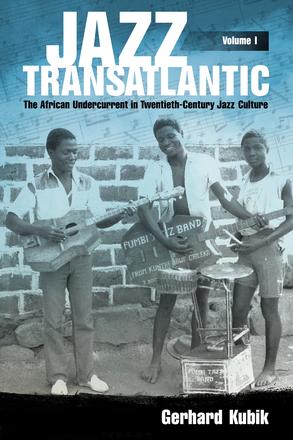
Jazz Transatlantic, Volume I
The African Undercurrent in Twentieth-Century Jazz Culture
The primary installment of a life’s work seeking the confluences between American and African jazz creation
Description
A CHOICE 2018 Outstanding Academic Title
In Jazz Transatlantic, Volume I, renowned scholar Gerhard Kubik takes the reader across the Atlantic from Africa to the Americas and then back in pursuit of the music we call jazz. This first volume explores the term itself and how jazz has been defined and redefined. It also celebrates the phenomena of jazz performance and uncovers hidden gems of jazz history. The volume offers insights gathered during Kubik's extensive field work and based on in-depth interviews with jazz musicians around the Atlantic world. Languages, world views, beliefs, experiences, attitudes, and commodities all play a role. Kubik reveals what is most important--the expertise of individual musical innovators on both sides of the Atlantic, and hidden relationships in their thoughts.
Besides the common African origins of much vocabulary and structure, all the expressions of jazz in Africa share transatlantic family relationships. Within that framework, musicians are creating and re-creating jazz in never-ending contacts and exchanges. The first of two volumes, Jazz Transatlantic, Volume I examines this transatlantic history, sociolinguistics, musicology, and the biographical study of personalities in jazz during the twentieth century. This volume traces the African and African American influences on the creation of the jazz sound and traces specific African traditions as they transform into American jazz. Kubik seeks to describe the constant mixing of sources and traditions, so he includes influences of European music in both volumes. These works will become essential and indelible parts of jazz history.
Reviews
"These books will be must-haves for institutional libraries and are worth considering for advanced music programs."
- Joe Bebco, The Syncopated Bookshelf
"He has insights into the importance of musicians barely known on this side of the Atlantic, among them Winston Mankunku Ngozi, Donald Kachamba, and Duke Makasi. These valuable volumes will endure."
- Doug Ramsey, Rifftides
"The culmination of over 60 years of field research and immense learning, Jazz Transatlantic is a remarkable contribution to the academic literature and a milestone achievement for Gerhard Kubik. To a degree never before achieved, it distills what can be known of the African cultural and musical contribution to jazz."
- Joe Bebco, The Syncopated Times
"Gerhard Kubik is one of a few ethnomusicologists specializing in Africa who have a familiarity with jazz. . . . [Jazz historians] should also use Kubik's findings to write new chapters about Africa's musical past and present in their histories."
- Edward Komara, ARSC Journal
"These two volumes are thought-changers."
- Duncan Heining, Popular Music
"Kubik has done the field a great service by providing this synthetic account of his own work. Although contemporary work in the field has justifiably critiqued the legacy of Herskovits and comparative musicology, Kubik has shown us the power of sustained fieldwork to generate audiovisual materials that will likely outlive the weaknesses of the conceptual academic frameworks that shaped their collection."
- Ingrid Monson, Harvard University, Ethnomusicology, Vol. 64, No. 1, Winter 2020
"With Jazz Transatlantic, Gerhard Kubik has demonstrated, once again, that he is a seasoned researcher, scholar, and educator. Kubik leaves no stone unturned. Jazz Transatlantic synthesizes known knowledge about the genesis and dissemination of the word jazz and its practice as seen in the light of a new intellectual prism on both sides of the Atlantic. He avoids fashionable jargon and uses simple language accessible to readers of all levels. The author has cast the jazz topic in a mixture of related stories, such as the rise of samba in Brazil and the development of Congolese popular music, in order to create a broader picture of jazz. Jazz Transatlantic is divided into two volumes. Each volume does not contain mere reporting of ethnographic data and reviews of the existing literature on jazz, but an excursion into learning experience about more than music. It is contextualized in a broader cultural frame of reference and interpreted in light of theory and methodology from the fields of history, anthropology, linguistics, psychology, and ethnomusicology. In short, Jazz Transatlantic is quintessential research, par excellence, with which to unveil the significance, and to decipher the meaning, of any cultural expression."
- Dr. Kazadi wa Mukuna, professor of ethnomusicology and director of the African Ensemble at the Hugh A. Glauser School of Music, Kent State University